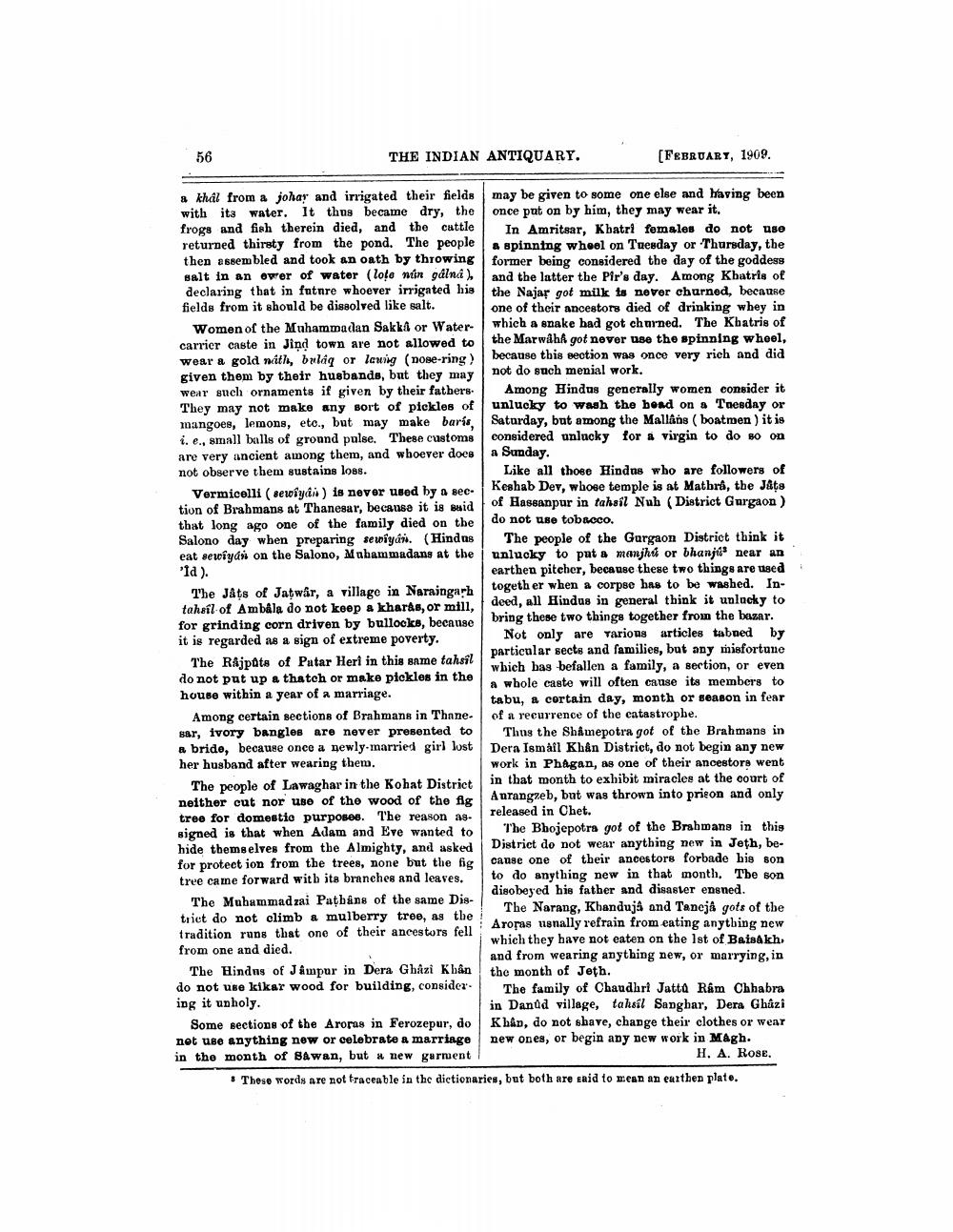________________
56
THE INDIAN ANTIQUARY.
a khal from a johay and irrigated their fields with its water. It thus became dry, the frogs and fish therein died, and the cuttle returned thirsty from the pond. The people then assembled and took an oath by throwing salt in an ewer of water (lote nun galna), declaring that in future whoever irrigated his fields from it should be dissolved like salt.
Women of the Muhammadan Sakkâ or Watercarrier caste in Jind town are not allowed to wear a gold nath, bulaq or laung (nose-ring) given them by their husbands, but they may wear such ornaments if given by their fathers. They may not make any sort of pickles of mangoes, lemons, etc., but may make baris, i. e., small balls of ground pulse. These customs are very ancient among them, and whoever does not observe them sustains loss.
Vermicelli (sewiydi) is never used by a section of Brahmans at Thanesar, because it is said that long ago one of the family died on the Salono day when preparing sewiyan. (Hindus eat sewîyan on the Salono, Muhammadans at the 'Id).
The Jats of Jatwar, a village in Naraingarh tahsil of Ambala do not keep a kharks, or mill, for grinding corn driven by bullocks, because it is regarded as a sign of extreme poverty.
The Rajputs of Patar Heri in this same tahsil do not put up a thatch or make pickles in the house within a year of a marriage.
Among certain sections of Brahmans in Thanesar, ivory bangles are never presented to a bride, because once a newly-married girl lost her husband after wearing them.
The people of Lawaghar in the Kohat District neither cut nor use of the wood of the fig tree for domestic purposes. The reason assigned is that when Adam and Eve wanted to hide themselves from the Almighty, and asked for protect ion from the trees, none but the fig tree came forward with its branches and leaves.
The Muhammadzai Pathans of the same District do not climb a mulberry tree, as the tradition runs that one of their ancestors fell
from one and died..
The Hindus of Jampur in Dera Ghazi Khan do not use kikar wood for building, considering it unholy.
[FEBRUARY, 1909.
may be given to some one else and having been once put on by him, they may wear it.
Some sections of the Aroras in Ferozepur, do not use anything new or celebrate a marriage in the month of Sawan, but a new garment
In Amritsar, Khatri females do not use a spinning wheel on Tuesday or Thursday, the former being considered the day of the goddess and the latter the Pir's day. Among Khatris of the Najar got milk is never churned, because one of their ancestors died of drinking whey in which a snake had got churned. The Khatris of the Marwah got never use the spinning wheel, because this section was once very rich and did not do such menial work.
Among Hindus generally women consider it unlucky to wash the head on a Tuesday or Saturday, but among the Mallâns (boatmen ) it is considered unlucky for a virgin to do so on Sunday.
a
Like all those Hindus who are followers of Keshab Dev, whose temple is at Mathrâ, the Jats of Hassanpur in tahsil Nuh (District Gurgaon) do not use tobacco.
The people of the Gurgaon District think it unlucky to put a manjhú or bhanj near an earthen pitcher, because these two things are used together when a corpse has to be washed. Indeed, all Hindus in general think it unlucky to bring these two things together from the bazar.
Not only are various articles tabned by particular sects and families, but any misfortune which has befallen a family, a section, or even a whole caste will often cause its members to tabu, a certain day, month or season in fear of a recurrence of the catastrophe.
Thus the Shamepotra got of the Brahmans in Dera Ismail Khân District, do not begin any new work in Phagan, as one of their ancestors went in that month to exhibit miracles at the court of Aurangzeb, but was thrown into prison and only released in Chet.
The Bhojepotra got of the Brahmans in this District do not wear anything new in Jeth, because one of their ancestors forbade his son to do anything new in that month. The son disobeyed his father and disaster ensued.
The Narang, Khanduja and Taneja gots of the Aroras usually refrain from eating anything new which they have not eaten on the 1st of Baisakh. and from wearing anything new, or marrying, in the month of Jeth.
The family of Chaudhri Jattů Râm Chhabra in Danud village, tahsil Sanghar, Dera Ghazi Khân, do not shave, change their clothes or wear new ones, or begin any new work in Magh. H. A. ROSE. These words are not traceable in the dictionaries, but both are said to mean an earthen plate.




